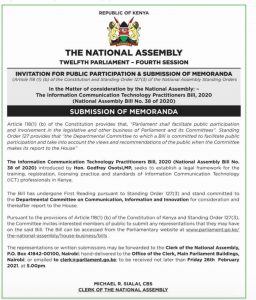 Finally, there is some progress and good news to the ICT practitioners in Kenya. The Information Communication Technology Practitioners Bill, 2020 (National Assembly Bill No. 38 of 2020) introduced by Hon. Godfrey Osotsi, MP, seeks to establish a legal framework for the training, registration, licensing practice and standards of Information Communication Technology (ICT) in Kenya.
Finally, there is some progress and good news to the ICT practitioners in Kenya. The Information Communication Technology Practitioners Bill, 2020 (National Assembly Bill No. 38 of 2020) introduced by Hon. Godfrey Osotsi, MP, seeks to establish a legal framework for the training, registration, licensing practice and standards of Information Communication Technology (ICT) in Kenya.
Article 118(1) (b) of the constitution provides that, parliament shall facilitate public participation and involvement in the legislative and other business of the parliament and its committee. Standing order 127 provides that “the Department Committee to which a Bill is committed to facilitate public participation and take into account the views and recommendations of the public when the committee makes its report to the house.”
A while back, BAKE joined other stakeholders that include; the Kenya Private Sector Alliance (KEPSA), Kenya ICT Action Network (KICTANET), Kenya Information Technology and Outsourcing Services (KITOS), Technology Service Providers of Kenya (TESPOK) and iHub to review the Bill in its entirety to guarantee that if it has to be passed, it promotes growth in the sector.
The Bill has undergone First Reading pursuant to standing order 127(3) and stand committed to the Departmental Committee on Communication, Information and Innovation for consideration and thereafter report to the House.
Back in 2016 when the ICT practitioner Bill was first revealed, there were some issues that were submitted by the stakeholders which include the following:
- Lack of stakeholder participation in the legislative process
- The Bill contravened and was unsupportive of the Government policies on ICT, youth and unemployment.
- The Bill had adverse labor implications
- Lack of research and analysis to identify gaps as the basis for legislation
- The lack of harmonization with global ICT standards and licensing regimes
- The Bill failed to take into account review of ICT policy
- The proposed institutional framework lacked clarity and merit.
- The Bill was incongruent with the realities of ICT Training, Research, and Development opportunities in the ICT sector
- Innovation and learning/ knowledge, technology transfer, and fostering tech entrepreneurship would have suffered if passed.
Pursuant to the provision of Article 118(1)(b) of the Constitution of Kenya and standing order 127(3), the Committee invites interested members of the public to present any representations that they may have said on the Bill. This Bill can be accessed from the Parliamentary website . The representations or any written submissions may be forwarded to the Clerk of the National Assembly, P.O BOX 41842-00100, Nairobi; hand-delivered to the Office of the Clerk, Main Parliament Buildings, Nairobi; or emailed to [email protected]; to be received no later than Friday 26th February 2021, at 5.00 pm.

